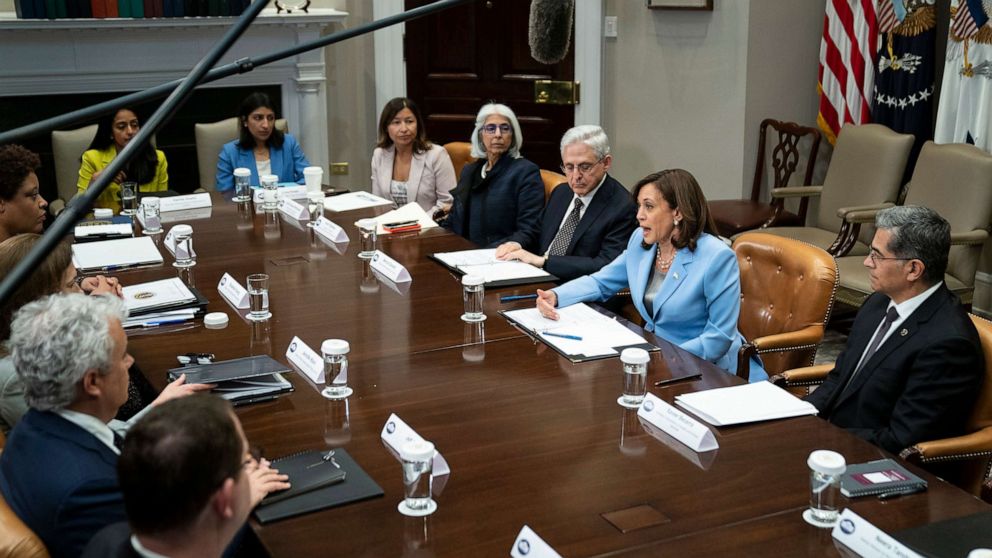由于美国人能否获得米非司酮仍然悬而未决,副总统卡玛拉·哈里斯于周三召开了一次白宫生殖健康工作小组会议卫生保健在此期间,内阁官员扩展了一种新的方式,他们打算在堕胎时保护个人隐私。
就在会议结束几个小时前,美国卫生与公众服务部宣布,它已经起草了一项新的联邦法规,旨在向医生和其他医疗专业人员明确透露堕胎者的详细信息违反隐私法HIPAA。
哈里斯解释说,写入1996年HIPAA法的一项例外规定,如果执法人员在刑事案件中需要信息,他们可以在获得法院命令后访问一个人的医疗记录。
这项新规定是对几个红色州通过法律的回应,此前最高法院驳回了罗伊诉韦德案,堕胎权利倡导者警告说,这是为了将寻求堕胎的医疗保健提供者和妇女定罪,即使在堕胎合法的州也是如此。
因此,这一拟议中的变化旨在削弱州政府对前往堕胎的妇女的调查,因此,它基本上为堕胎合法的医生提供了掩护,不提供来自堕胎不合法的州的调查记录。
“我遇到过害怕被吊销执照或被起诉的医生,他们担心这种情况会影响他们与病人之间的信任关系。哈里斯说:“这的确是美国的医疗保健危机。

2023年4月12日,美国副总统卡玛拉·哈里斯在白宫罗斯福厅与一个生殖保健服务工作组的会议上发表讲话。
埃文·伍奇/美联社
“特别是自从多布斯案的判决以来,许多州已经提出并通过了法律,将提供生殖健康服务的医疗服务提供者定罪,”她继续说道这将是一种犯罪,这意味着如果执法部门要求你的个人和私人医疗记录,他们很可能有权接收这些记录。"
官员们说,如果拟议的规则最终确定,医疗提供者和医生将不会被迫遵守这些调查。
卫生与公众服务部部长泽维尔·韦塞拉和司法部长梅里克·加兰站在哈里斯的一边,就这一变化意味着什么展开讨论。
和Harris一样,韦塞拉说他的办公室已经从妇女那里听到了“第一手”消息,即他们的医疗保健提供者正成为敌对行动者的目标,他们试图将堕胎护理的私人信息武器化。
他说:“因此,我们希望确保尽一切努力保护患者隐私,增进个人与医疗服务提供者之间的信任,并使个人能够获得高质量的适当医疗服务。”。
加兰还首次公开评论德克萨斯州联邦法官对米非司酮的裁决,因为司法部对此提出上诉,称国家最高执法机构“强烈反对法院前所未有的决定。”
该规则应用的一个例子可能是爱达荷州检察官调查一名成年人是否帮助将一名未成年人赶出该州进行堕胎,这将违反该州的“堕胎贩运”法。在州外帮助病人的医生不需要服从爱达荷州的调查。
“我见过全国各地的医生,他们分享了他们的故事,”卫生与公众服务部民权办公室主任梅拉妮·丰特斯·莱纳说,他起草了这项规定。“这些提供者表达了恐惧、愤怒和悲伤,他们或他们的患者可能会因为提供或获得循证和医学上适当的护理而入狱。”
据一位高级政府官员称,令人担忧的是一些医生——尤其是小诊所的医生——在面对传票时可能会感到害怕。这条规则提醒他们,禁止他们分享敏感医疗信息的联邦法律包括生殖健康护理。
在60天的公众意见征询期后,该规则需要最终确定才能生效。
With mifepristone in limbo, Harris reaffirms White House commitment to abortion access
With Americans' access to the abortion pill mifepristone still in limbo, Vice President Kamala Harris on Wednesday convened a meeting of a White House task force on reproductivehealth careduring which Cabinet officials expanded on a new way they intend to protect a person's privacy when it comes to abortion access.
The meeting fell just hours after the Department of Health and Human Services announced it had drafted a new federal rule intended to make clear to doctors and other medical professionals that divulging details of a person getting an abortion violates the privacy law HIPAA.
Harris explained that an exception written into the 1996 HIPAA law provides that if law enforcement officials needed information in pursuit of a criminal matter, they could access a person's medical records after getting a court order.
The new rule is in response to several red states passing laws, in the wake of the Supreme Court overruling Roe v. Wade, which abortion rights advocates warn are intended to criminalize health care providers and women who seek abortions, even in states where the procedure is legal.
This proposed change, then, is aimed at blunting state-run investigations into women traveling for abortions, so it would essentially provide cover for doctors where abortion is legal to not provide records in investigations stemming from states where the procedure is not.
"I have met with and talked with doctors who are in fear of losing their license or being prosecuted, and of this situation actually having an impact on the relationships of trust that they have with their patients. This indeed is a health care crisis in America," Harris said.
"Since the Dobbs' decision, in particular, many states have proposed and passed laws that are now going to criminalize health care providers for providing reproductive health care," she continued. "It's going to be a crime, which means that it is very likely if law enforcement requests your personal and private medical records, they may be entitled to receive them."
Medical providers and doctors would not be forced to comply with those investigations if the proposed rule is finalized, officials said.
Health and Human Services Secretary Xavier Becerra and Attorney General Merrick Garland flanked Harris for the discussion, to expand on what the change means.
Becerra, like Harris, said his office has already heard "first-hand" from women that their health care providers are being targeted by hostile actors trying to weaponize private information surrounding abortion care.
"And so we want to make sure we do everything we can to ensure patient privacy, bolster trust between individuals and their health care providers and enable individuals to obtain high-quality appropriate health care," he said.
Garland also made his first public comments about the mifepristone ruling by the federal judge in Texas, since the Justice Department appealed it, saying the nation's top law enforcement agency "strongly disagrees with the court's unprecedented decision."
An example of the rule's application might be Idaho prosecutors investigating whether an adult helped drive a minor out of state for an abortion, which would violate the state's "abortion trafficking" law. Doctors who assisted the patient out-of-state would not be required to comply with Idaho's investigation.
"I have met with doctors across the country who have shared their stories," said Melanie Fontes Rainer, director of the civil rights office within Health and Human Services, which drafted the rule. "These providers have expressed fear, anger, and sadness that they or their patients may end up in jail for providing or obtaining evidence-based and medically appropriate care."
According to a senior administration official, the concern is that some doctors -- particularly with smaller practices -- might be fearful when faced with subpoenas. This rule reminds them that the federal law prohibiting them from sharing sensitive medical information includes reproductive health care.
Following a 60-day public comment period, the rule will need to be finalized before taking effect.






